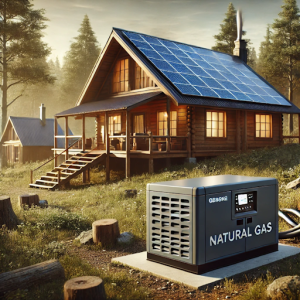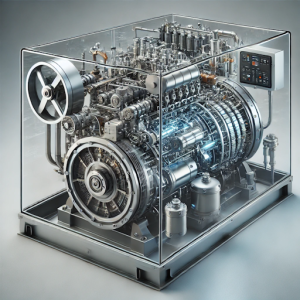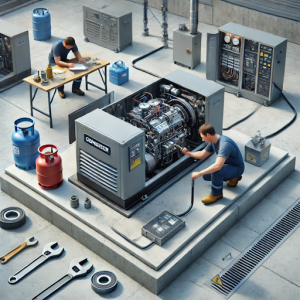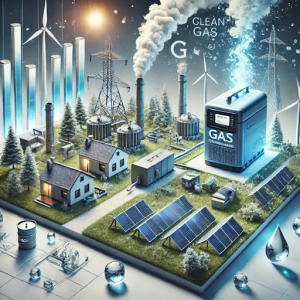Discover How Natural Gas Generators Enhance Sustainable Off-Grid Living
Natural gas generators emerge as a top-tier solution for those in search of a dependable energy source for residences or cabins situated in secluded regions. Gaining insight into the various energy generation methods is vital for anyone aspiring to thrive in an off-grid lifestyle. The unique benefits of natural gas generators—including their reliability, cost-effective nature, and environmentally friendly characteristics—make them an appealing choice for off-grid living enthusiasts who value sustainability and operational efficiency.
In today’s technologically advanced world, the concept of off-grid living has garnered significant attention. Driven by motivations such as sustainability, personal autonomy, or the pursuit of a self-sufficient lifestyle, disconnecting from conventional power grids can be profoundly rewarding. Off-grid power solutions enable individuals to harness energy from renewable resources or alternative fuels, supporting a comfortable living experience that is independent of traditional electricity sources.
Equipping yourself with the necessary knowledge and preparation is essential for effectively integrating a natural gas generator into your off-grid lifestyle, ensuring your critical energy needs are continuously met with a reliable power supply. This article will delve into the extensive benefits of natural gas generators, clarify their operational mechanisms, and highlight essential considerations for selecting and installing them in your off-grid setup.
 Key Insights to Optimize Your Off-Grid Power Solutions
Key Insights to Optimize Your Off-Grid Power Solutions
- Embracing off-grid power solutions empowers you to liberate yourself from traditional energy sources, making them indispensable for remote living or in the event of unforeseen power disruptions.
- Natural gas generators are known for providing reliable and efficient energy production, significantly reducing emissions compared to diesel or gasoline alternatives.
- These generators function by combusting natural gas to create mechanical energy, which is converted into electrical energy through an integrated generator system.
- When selecting a natural gas generator, it is vital to assess aspects like power output, fuel efficiency, and maintenance requirements to guarantee optimal performance.
- Proper installation and regular maintenance are essential to ensure the safe and efficient operation of your natural gas generator.
Uncover the Outstanding Benefits of Natural Gas Generators for Power Generation
One of the standout features of natural gas generators is their remarkable reliability. By choosing a natural gas generator for your off-grid energy needs, you can trust that a consistent power supply will be available to meet your requirements. Unlike solar panels or wind turbines, which can be negatively affected by changes in weather, natural gas generators offer a stable energy output that remains unaffected by external factors.
This reliability is especially critical for those who require electricity for essential operations such as heating, refrigeration, or running medical devices. Knowing that your generator will deliver power at crucial moments brings a sense of security. In addition to their dependability, natural gas generators also offer substantial cost savings.
While the upfront cost may be higher than some other off-grid options, the long-term savings can be significant. Natural gas is generally more economical than gasoline or diesel, resulting in lower operational costs over time. Additionally, natural gas generators typically demand less frequent maintenance compared to their counterparts, allowing you to conserve both time and resources while enjoying a consistent energy supply.
 Understanding the Operational Mechanics of Natural Gas Generators
Understanding the Operational Mechanics of Natural Gas Generators
Natural gas generators work by transforming the chemical energy found in natural gas into electrical energy through a combustion process. When the generator is activated, natural gas is mixed with air and ignited in the engine’s combustion chamber. This ignition generates high-pressure gases that drive the engine’s pistons, ultimately turning the rotor of the generator and producing electricity.
This operational approach is distinguished by its efficiency, as it produces cleaner emissions compared to other fossil fuel alternatives. A crucial component of a natural gas generator is its fuel system, which usually includes a regulator that controls the gas flow to optimize performance. Modern natural gas generators often come equipped with advanced features, such as automatic start/stop capabilities and remote monitoring options.
These innovations greatly enhance user convenience, allowing you to manage your power supply more effectively and simplifying your off-grid experience.
Essential Considerations for Selecting a Natural Gas Generator
| Consideration | Description |
|---|---|
| Power Output | Determine the generator’s required power output based on the appliances and equipment you plan to operate. |
| Fuel Type | Consider natural gas as your fuel choice due to its clean-burning and cost-effective attributes. |
| Size and Portability | Select a generator size and portability that align with your available space and mobility needs. |
| Noise Level | Assess the generator’s noise output to ensure it meets the acceptable standards for your living environment. |
| Start-up Mechanism | Decide between manual or automatic start-up options based on your convenience and usage frequency. |
When choosing a natural gas generator for your off-grid setup, several critical factors must be evaluated. First, assess your power requirements. Calculate the total wattage necessary to support your essential appliances and devices, ensuring that your selected generator can manage the load efficiently.
It is advisable to choose a generator with a slightly higher capacity than your calculated requirements to allow for sudden spikes in power demand. Another vital aspect to consider is the generator's portability and installation requirements. If you plan to move your generator frequently or use it in several locations, look for a lightweight and easily transportable model.
Additionally, consider whether you prefer a stationary unit or a portable generator that can be conveniently set up based on your needs. Lastly, pay attention to the noise level of the generator; quieter models can significantly enhance your off-grid experience by minimizing disturbances and preserving the tranquility of your natural surroundings.
 Best Practices for Installing and Maintaining Your Natural Gas Generator
Best Practices for Installing and Maintaining Your Natural Gas Generator
The installation process of a natural gas generator requires meticulous planning and execution to ensure both safety and efficiency. Begin by selecting an appropriate location for your generator, ensuring compliance with local regulations and safety standards. Ideally, the site should be well-ventilated and distanced from flammable materials.
You may need to create a concrete pad or platform to stabilize and protect the generator from moisture damage. Once the ideal location is established, connect the generator to your natural gas supply line. If you're inexperienced with gas line installations, seeking professional help is advisable to ensure compliance with safety regulations.
After establishing the fuel connection, set up the necessary electrical connections to integrate the generator into your home’s electrical system. Regular maintenance is crucial for ensuring your generator operates smoothly, including routine checks on oil levels, air filter replacements, and spark plug inspections to maintain optimal performance.
Cost Analysis: Comparing Natural Gas Generators with Alternative Off-Grid Power Solutions
When assessing the costs associated with off-grid energy solutions, it is important to conduct a comprehensive comparison between natural gas generators and other alternatives such as solar panels and diesel generators. Although solar energy systems are celebrated for their renewable characteristics, they often require a considerable initial investment in panels, batteries, and inverters. Additionally, solar systems may struggle to provide adequate power on cloudy days or during the night without sufficient battery storage.
On the other hand, diesel generators are recognized for their reliability; however, they incur higher fuel costs and more frequent maintenance needs compared to natural gas generators. With diesel fuel prices subject to significant fluctuations, natural gas typically presents a more stable and often lower-cost option across many regions. A long-term cost analysis indicates that natural gas generators generally offer a more economical solution for those committed to off-grid living.
 Assessing the Environmental Impact of Natural Gas Generators in Off-Grid Living
Assessing the Environmental Impact of Natural Gas Generators in Off-Grid Living
As you evaluate your off-grid energy choices, it is crucial to consider their environmental impact. Natural gas is often marketed as a cleaner alternative to other fossil fuels, such as coal or oil, due to its lower carbon emissions during combustion. By opting for a natural gas generator, you can significantly reduce your carbon footprint while maintaining reliable power for your off-grid lifestyle.
However, it is essential to recognize that natural gas remains a fossil fuel, and its extraction can lead to environmental challenges. Methane leaks during extraction and transportation present serious concerns regarding greenhouse gas emissions. To address these issues, prioritize sourcing natural gas from reputable suppliers who adhere to sustainable practices.
Moreover, incorporating renewable energy sources alongside your natural gas generator can further showcase your commitment to environmental sustainability and responsible energy consumption.
Inspiring Real-Life Examples of Off-Grid Power Solutions Utilizing Natural Gas Generators
Examining real-world case studies provides valuable insights into the effective use of natural gas generators in off-grid living scenarios. For instance, numerous rural homeowners have transitioned to natural gas generators as their primary energy source after enduring frequent outages from conventional utility services. The adoption of these generators has empowered them to achieve energy independence while ensuring a continuous power supply for heating, cooling, and essential appliances.
Another notable example involves remote cabins that rely on natural gas generators for seasonal use. Because of their isolated locations, these cabins often lack access to traditional power sources. Natural gas generators enable cabin owners to enjoy modern conveniences, such as refrigeration and lighting, without sacrificing their connection to the natural environment.
These success stories exemplify how natural gas generators can effectively facilitate off-grid living, providing comfort and reliability. As you embark on your off-grid journey, consider the extensive benefits that natural gas generators offer. With their reliability, cost-efficiency, and relatively low environmental impact, these generators can significantly contribute to achieving energy independence.
By carefully selecting the right model for your specific needs and adhering to proper installation and maintenance guidelines, you can smoothly transition to an off-grid lifestyle powered by natural gas.
Answers to Frequently Asked Questions About Natural Gas Generators
What Characterizes a Natural Gas Generator for Off-Grid Applications?
A natural gas generator designed for off-grid living is a power generation system that utilizes natural gas as a fuel source to produce electricity in remote locations where access to the main power grid is limited or unavailable.
How Does a Natural Gas Generator Function for Off-Grid Use?
A natural gas generator intended for off-grid applications operates by combusting natural gas within an internal combustion engine. This process generates mechanical energy, which is then converted into electrical energy through a generator. The electricity produced can power various appliances, equipment, and lighting in off-grid settings.
What Are the Key Benefits of Using a Natural Gas Generator in Off-Grid Living?
Significant advantages of utilizing a natural gas generator for off-grid living include:
– Lower fuel costs compared to diesel or gasoline generators
– Cleaner combustion leading to reduced emissions
– Continuous fuel supply sourced from natural gas pipelines
– Decreased maintenance requirements relative to other fuel types
What Factors Should Be Considered When Using a Natural Gas Generator for Off-Grid Living?
Critical considerations when utilizing a natural gas generator in off-grid scenarios encompass:
– Availability of natural gas supply in your area
– Initial installation and equipment costs
– Regular maintenance and servicing needs
– Environmental implications and compliance with emissions regulations
Is It Feasible to Use a Natural Gas Generator Off-Grid for Residential and Commercial Purposes?
Natural gas generators designed for off-grid use are suitable for both residential and commercial applications. They are commonly utilized in remote homes, cabins, farms, and small businesses that lack connectivity to the main power grid.
The post Natural Gas Generators for Off-Grid Power Solutions appeared first on Survival Bite.
The Article Natural Gas Generators: Your Off-Grid Power Solution Was Found On https://limitsofstrategy.com


Your exploration of the benefits of natural gas generators really highlights an important aspect of off-grid living—balancing sustainability with practicality. I’ve been contemplating this transition myself, drawn by the idea of a self-sufficient lifestyle, yet I find the energy source choice crucial. While natural gas offers reliability and a reduced carbon footprint compared to diesel, I wonder how it compares to emerging innovations like solar or wind in terms of long-term sustainability.